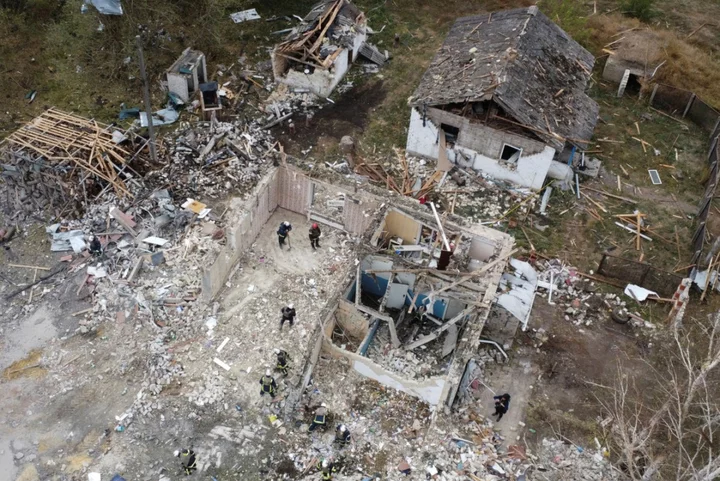
‘You can still smell the blood’: Inside the village where more than 50 were killed by a Russian missile
Many woke up dazed in the Ukraine’s Hroza on Friday – with the village in the northeast of the country having lost a fifth of residents in the devastation caused by a Russian missile strike the previous day. Ihor Klymenko, Minister of Internal Affairs of Ukraine has said the village only had 330 residents – and that at least 52 had been killed in the assault. He added that every family had at least one person they knew at the wake for Ukrainian soldier Andrii Kozyr inside the cafe (and grocery shop) that was wrecked by the missile. That wake followed a funeral that had been an attempt to rebury a father who had been killed in Russian-occupied territory last year. Now candles mark the spot where the lives of those mourners were lost. Residents have said that the cafe, Hrozivske, had been closed for much of the time since Russia’s invasion began in February last year, and that the wake had marked one of the first major events of its reopening. The strike that followed is one of the deadliest of the war. Alina, 23 – who only wanted to be known by her first name – moved to the village after marrying a local three years ago. Alina says herself and her husband were due to be at the memorial, but their car engine faltered and they couldn’t make it in time. “We were meant to be there. We were meant to be dead,” she says. Now all she feels is anger at the missile strike. “They were just normal people living a normal life,” she says of those who died. “Most of them were farmers, working with wheat and barley.” The village, in the Kharkiv region, was founded in 1922, and its name translates as “thunderstorm”. It was first occupied by Russian forces in February 2022 and was liberated by Ukrainian forces that September. Alina says that when the village was occupied by Moscow’s forces, mostly older people stayed behind as the younger residents fled. When the village was due to celebrate its centennial anniversary last year, she says that residents spent the time hiding in their cellars. “We felt enormous joy when Russian forces left,” she continues. “It was great to be Ukraine again. [Now] I have no words for what’s happened.” Hroza had 501 inhabitants before the invasion according to local journalist Iryna Antoniuk, who is a correspondent with the My-Ukraina [We Are Ukraine] TV Channel. She says that half of the 300 or so who remained in the village had been in attendance at the wake. In a morning visit to the village, less than 24 hours after the attack Ms Antoniuk says “you can still smell the blood” among the wreckage. “It’s a tiny little village,” says Ms Antoniuk. “This building that was hit, was in the very centre, so it’s so noticeable. Immediately, when you enter the village, you notice it. People have started bringing flowers now to pay tribute.” Workers at the local cemetery cut down trees and mowed grass to prepare graves for those killed. They are to be buried not far from the soldier Kozyr, whose wake they were attending. Residents also gathered to mourn in groups in the village centre, which was largely deserted except for people picking up humanitarian aid, including materials to repair their damaged houses. Dr Robert Dale, Senior Lecturer of Russian History at Newcastle University says: “Hroza... has seen much bombardment during the Russian offensive. “This is a location that as a borderland area has long been a site of conflict, and at the sharp end of wars. The Kharkiv region suffered very badly in the ‘Russian’ Civil War, the Holodomor, and the area changed hands repeatedly in the Second World War... Perhaps one reason for why Hroza seems to have so little recorded history is that these rural regions have been ravaged throughout the twentieth century.” He added: “The Kharkiv region’s proximity to the Russian border means that it has born much of the brunt of... this conflict.” The Hroza victims made up most of the 54 civilians killed in the country over the previous 24 hours, Ukraine's presidential office said Friday. The UN human rights chief, Volker Turk, said he was "shocked and saddened" by the attack. In a sign of the continuing assault Ukrainians face in the Kharkiv region. On Friday morning, Ukrainian officials said another two Russian missiles had killed a 10-year-old boy and his grandmother in the city of Kharkiv itself. Emergency crews pulled the boy's body from the rubble of a building. He was wearing pyjamas with a Spider Man design. The strike also killed the boy's grandmother and wounded an 11-month-old child, the interior minister Klymenko said. The regional governor, Oleh Syniehubov, said that in all, 30 people were wounded. Rescue operations were continuing. Officials said preliminary information indicated that the Kremlin's forces used two Iskander missiles in the attack, the same as in the strike on Hroza. The attack may have only lasted seconds, but Alina says she will feel the hurt for a long time. “I knew every single person that has died. They were our buddies, our friends, our family and neighbours,” she says. Read More Nobel Peace Prize awarded to jailed Iranian women’s rights ‘freedom fighter’ Narges Mohammadi Ukraine-Russia war – live: Latest missile strike by Putin’s forces kills boy and his grandmother in Kharkiv Berlin exists on the border of freedom and chaos – it’s why I keep coming back
2023-10-07 01:46
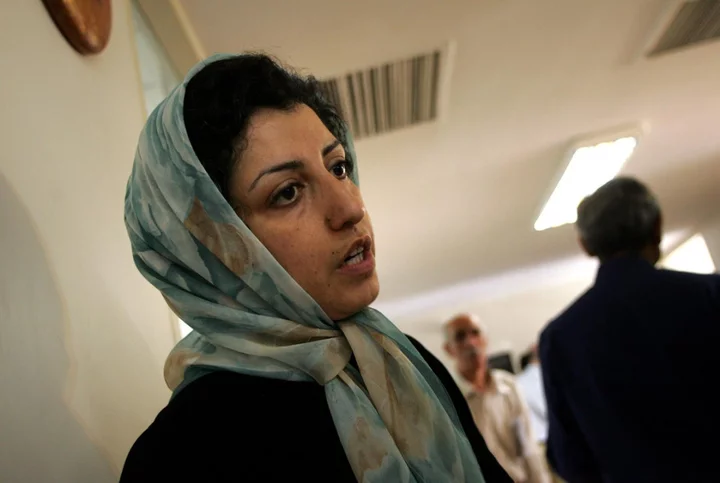
Nobel Peace Prize awarded to jailed Iranian women’s rights ‘freedom fighter’ Narges Mohammadi
Narges Mohammadi, an activist serving a 10-year sentence in an Iranian prison, was awarded the 2023 Nobel Peace Prize on Friday “for her fight against the oppression of women.” The decision comes after more than a year of protests, spearheaded by women, after 22-year-old Mahsa Amini died in the custody of the country’s morality police. Unrest spread rapidly, with demands ranging from greater freedoms to an overthrow of the regime. Mohammedi is the 19th woman to win the Nobel Peace Prize and the second Iranian woman, after human rights activist Shirin Ebadi won the award in 2003. “She fights for women against systematic discrimination and oppression,” the head of the Norwegian Nobel Committee, Berit Reiss-Andersen, said at the announcement in Oslo. Mohammadi supports the struggle for women to live "full and dignified lives" and that she is a “freedom fighter,” Ms Reiss-Andersen said. Mohammadi, 51, has kept up her activism from inside Tehran’s Evin Prison where she is currently serving multiple sentences totalling more than a decade. An engineer by training, she has been imprisoned 13 times and convicted five times during her years of campaigning. Ms Reiss-Andersen began her announcement in Farsi, saying "woman, life, freedom" – one of the slogans of the protests. Images of Iranian women defiantly setting their headscarves on fire and chanting the phrase spread around the world. Mohammadi was behind bars as the protests grew nationwide, sparking one of the most-intense challenges ever to Iran's theocracy since its 1979 Islamic Revolution. More than 500 people were killed in a heavy security crackdown while more than 22,000 others have been arrested. But Mohammadi, 51, has kept up her activism and has remained a leading light for the protests. In a statement, Mohammadi said global support and recognition of her human rights advocacy makes her “more resolved, more responsible, more passionate and more hopeful.” “I also hope this recognition makes Iranians protesting for change stronger and more organised. Victory is near,” she said. Authorities arrested Mohammadi last November after she attended a memorial for a victim of 2019 protests that began over fuel prices but morphed into a broader show of dissent that was crushed by security forces in a bloody crackdown. Charges against her – which the international community have decried – include spreading propaganda against the state. Nazanin Zaghari-Ratcliffe, a British-Iranian national who spent time in Tehran's Evin jail with Ms Mohammadi until she was released in March 2022, said that her friend was “an inspiration”. "[The announcement] makes me cry. She did so much for all of us in Evin. Narges is an inspiration and a pillar to the women in the female ward in Evin for her fearless fight against violations of women's rights, the use of solitary confinement and execution in the judicial system in Iran,” she told the BBC. Ms Reiss-Andersen said the peace prize award also recognised the hundreds of thousands of people who have demonstrated against Iranian discrimination and oppression of women. "This prize is first and foremost a recognition of the very important work of a whole movement in Iran, with its undisputed leader, Narges Mohammadi," she said. "Only by embracing equal rights for all can the world achieve the fraternity between nations that [prize founder] Alfred Nobel sought to promote," she said. Mohammadi has a long history of imprisonment, harsh sentences and international calls for reviews of her case. She has been arrested around a dozen times and has faced serveral convictions by the Iranian state. "If the Iranian authorities make the right decision, they will release her so that she can be present to receive this honour, which is what we primarily hope for," Ms Reiss-Andersen said. There was no immediate official reaction from Tehran, which claims the protests against the state are Western-led subversion. But the semi-official news agency Fars said Mohammadi had “received her prize from Westerners.” Mohammadi's husband, Taghi Rahmani, applauded in his home in Paris as he watched the announcement on television. “This Nobel Prize will embolden Narges' fight for human rights, but more importantly, this is in fact a prize for the 'women, life and freedom' movement,” he said. Before being jailed, Mohammadi was vice president of the banned Defenders of Human Rights Center in Iran. Ebadi founded the centre. Ebadi left Iran after the disputed re-election of then-President Mahmoud Ahmadinejad in 2009 that touched off unprecedented protests and harsh crackdowns by authorities. “I congratulate Narges Mohammadi and all Iranian women for this prize ... this prize will shed light on violation of women's rights in the Islamic Republic ... which unfortunately has proven that it cannot be reformed,” Ebadi said. According to the will of Alfred Nobel, the prize should be awarded to the person "who has done the most or best to advance fellowship among nations, the abolition or reduction of standing armies, and the establishment and promotion of peace congresses". Previous winners of the prize – which can be awarded to individuals or organisations – include Nelson Mandela, Barack Obama, Mikhail Gorbachev, Aung San Suu Kyi and the United Nations. Last year’s prize was won by human rights activists from Ukraine, Belarus and Russia, in what was seen as a strong rebuke to Vladimir Putin in the wake of his invasion of Ukraine. Unlike the other Nobel prizes, which are selected and announced in Stockholm, the peace prize is awarded in Oslo by the five-member Norwegian Nobel Committee. The prizes are handed out at ceremonies in December; they carry a cash award of 11 million Swedish kronor (about £820,000). Winners also receive an 18-carat gold medal and diploma. Reuters and Associated Press contributed to this report Read More Moment Nobel Peace Prize awarded to jailed Iranian campaigner Narges Mohammadi Latest Russian missile strike on Ukraine kills boy and his grandmother in Kharkiv Scale of deadly Russian strike in Kharkiv village shown in drone footage Latest Russian missile strike on Ukraine kills boy and his grandmother in Kharkiv Scale of deadly Russian strike in Kharkiv village shown in drone footage Ex-lover of Spain's former king loses $153 million harassment lawsuit in London court
2023-10-06 22:26
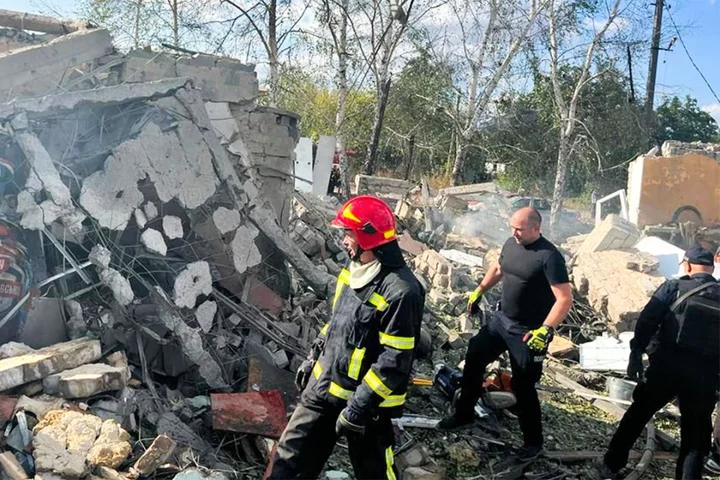
Ukraine-Russia war – live: Hroza Iskander missile attack kills 51 as Putin delivers rambling speech
A Russian missile attack has killed 51 people at a memorial service, including a six-year-old boy, in what Ukraine’s president Volodymyr Zelensky has called “no blind strike”. The Russian missile slammed into a cafe and shop in a village in northeastern Ukraine on Thursday, killing 51 people in Hroza village in the eastern Kharkiv region. The attack – thought to have been carried out using an Iskander ballistic missile – appears to have caused one of the biggest civilian death tolls in any single Russian strike. Mr Zelensky, who was attending a summit with European leaders, said: “Russian troops could not have been unaware of where they were hitting. This was no blind strike.” "The terrorists deliberately carried out the attack during lunchtime, to ensure a maximum number of casualties," said Defence Minister Rustem Umerov. "There were no military targets there. This is a heinous crime intended to scare Ukrainians." Meanwhile, Russian President Vladimir Putin on Thursday evening called the Canadian parliament's standing ovations to honour a Ukrainian war veteran who served in Nazi Waffen SS units "disgusting", and said it showed Moscow was right to "denazify" Ukraine. Canadian Prime Minister Justin Trudeau last month formally apologised after the speaker of the Canadian House of Commons, Anthony Rota, praised 98-year-old ex-soldier Yaroslav Hunka in the chamber while Ukrainian President Volodymyr Zelenskiy was present. Rota said he had made a mistake and resigned. "He essentially lumped together Nazi collaborators, SS troops and the Ukrainian military of today who are fighting against Russia," Putin told an audience at the Valdai Discussion Club in Sochi in response to a question. "This only confirms our thesis that one of our goals in Ukraine is denazification." Read More Russian missile strike kills more than 50 Ukrainians gathered for wake – in deadliest such attack in months Former Russian state TV journalist gets 8 1/2-year sentence in absentia for Ukraine war criticism Russia facing ‘functional defeat’ in the Black Sea – but Kyiv allies warn they are running out of ammunition Russia may attack civilian ships with sea mines and blame Ukraine, UK warns
2023-10-06 15:27
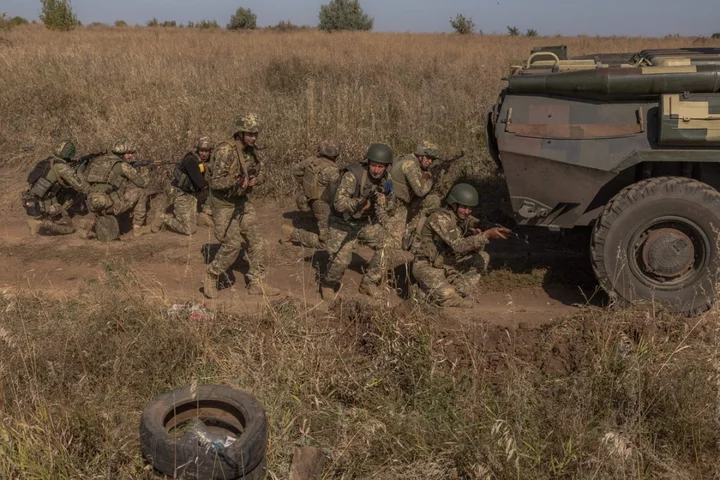
Ukraine says gains made amid intense fighting in east despite Russia’s aerial dominance
Ukrainian forces have advanced in the eastern part of the war-hit nation where officials said Vladimir Putin has deployed over 110,000 troops, but Kyiv officials reported pressure further north. The intensity of assaults have increased in the Lyman-Kupiansk sector, Ilia Yevlash, spokesperson for Ukraine’s eastern group of forces, said. Mr Yevlash called the two towns the “most difficult area” as Russian forces use both ground and air forces. Russian forces are actively using fighter jets, Su-35 and Su-25, and helicopters Ka-52 and Mi-8 in the region, he said. They were backed by Su-35 attack aircraft and started attacking along the frontline in the direction of Makiivka in the Luhansk region. Lyman and Kupiansk towns in Kharkiv oblast were recaptured by Ukrainian troops late last year and have witnessed continuous Russian assaults since then. “The enemy has chosen a new point – Makiivka – and is directing all its main efforts into this direction. Of course, we are also repulsing enemy attacks and inflicting damage on forces and equipment," Mr Yevlash said in a daily update. Kyiv’s battle to regain ground near the ghost city of Bakhmut, which has been reduced to rubble in a warfare lasting over a year, is also continuing in the eastern theatre. Two main theatres of war – in southern Ukraine and eastern Ukraine – have cropped up during Kyiv’s four-month old counteroffensive to push back Russian forces off its soil. In its evening report, the general staff of Ukraine’s Armed Forces claimed Kyiv’s troops had "achieved success" south of Andriivka. The village south of Bakhmut was captured by Ukrainian troops last month in the Donetsk region. The Ukrainian general staff said its forces were pressing on with their southward advance in the Zaporizhzhia region and had repelled a Russian attack near the village of Robotyne. The report said Russian forces had unsuccessfully tried to regain lost positions in an area further south. This was further corroborated by Russian accounts of the fighting which said Moscow’s forces had repelled two Ukrainian attacks west of the Russian-held city of Donetsk. In the southern theatre, Kyiv’s forces are pushing toward the Sea of Azov in an attempt to split Russian-occupied territory in two. Read More Ukraine-Russia war – live: Deadly Russian attack on memorial service was no blind strike, says Zelensky Putin says Wagner chief Prigozhin’s plane blown up by hand grenades on board Putin deliberately attacked Ukrainian civilians in Kharkiv missile strike, says Zelensky A look at Russia's deadliest missile attacks on Ukraine White House condemns ‘horrifying’ Russian attack on grocery store in Ukraine
2023-10-06 15:25
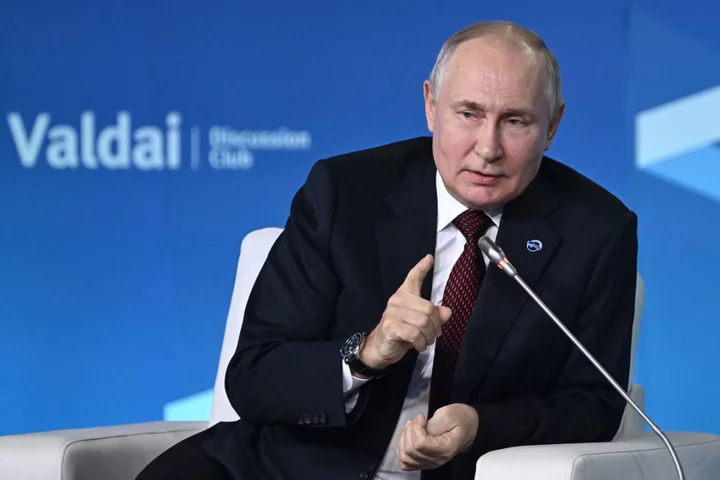
Putin says Wagner chief Prigozhin’s plane blown up by hand grenades on board
Russian president Vladimir Putin said the plane carrying Wagner mercenary chief Yevgeny Prigozhin was blown up from the inside and fragments of hand grenades have been found in the bodies of those killed in the crash. This is the first time Mr Putin commented on the details of the plane crash that killed Prigozhin – the mercenary leader who had challenged his regime and launched a military coup by marching onto Moscow in a dramatic threat to the Kremlin not seen in decades. "Fragments of hand grenades were found in the bodies of those killed in the crash," Mr Putin told a meeting of the Valdai Discussion Club in the Black Sea resort of Sochi, but did not share any details on the type and number of hand grenades that could have been detonated on board. He denied an external influence or targeting of the plane from the outside. "There was no external impact on the plane – this is already an established fact," he said, rejecting assertions by unidentified US officials who said shortly after the crash that they believed it had been shot down. Mr Putin said the head of Russia’s investigative committee had reported to him a few days ago. The private Embraer jet carrying the Wagner leader and the mercenary group’s co-founder along with eight other people crashed north of Moscow on 23 August. All 10 people onboard were reported dead. Mr Putin also suggested that the remains of the passengers, including Prigozhin, should have been tested for alcohol and drugs. He said he thought investigators were wrong to have not carried out these tests on the bodies of those killed in the crash. "In my opinion, such an examination should have been carried out but it was not," he said. The searches of Wagner’s offices in St Petersburg by the FSB found 10bn roubles ($100m) in cash and 5kg (11 pounds) of cocaine, he said. The investigators of the crash have yet to report publicly on the cause. Neither Wagner nor Prigozhin’s family could be reached to comment on Mr Putin’s remarks. Prigozhin had claimed pride in casting Wagner as the world’s most war-hardened fighting force and was known to have carried out Russia’s dirty work in middle-east and Africa. The mercenary fighters waged a brutal battle – dubbed the “meat grinder” – in Bakhmut last year in winter, where they eventually handed Moscow its biggest territorial gain in many months. Just two months before his death, he had accused Mr Putin’s top military brass, defence minister Sergei Shoigu and general staff Valery Gerasimov of incompetence and warned that Russia could lose the war in Ukraine unless it raised its game. The brief mutiny against Russia’s defence establishment posed the biggest challenge to Putin’s rule since the former KGB spy came to power in 1999. According to the leaders in the West, not only did it expose the strains on Russia of the war in Ukraine, it also showed the worsening relations between the Russian president and his long-time stooge. Read More Putin’s ‘punishment battalions’ full of convicts and drunk recruits: ‘They’re just meat’ Wagner succession: Yevgeny Prigozhin’s son ‘set to be next mercenary boss’ Putin orders former Wagner commander to take charge of 'volunteer units' in Ukraine ‘Weak’ Putin killed Wagner mercenary chief Prigozhin, Zelensky says
2023-10-06 13:45
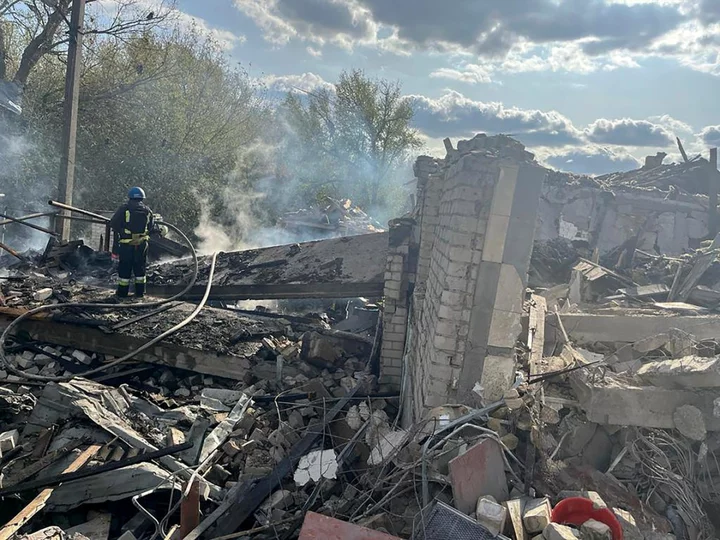
Putin deliberately attacked Ukrainian civilians in Kharkiv missile strike, says Zelensky
Vladimir Putin’s missile attack on a cafe and grocery store in northeastern Ukraine that led to 51 deaths, six injuries and three people left missing was “no blind strike”, said president Volodymyr Zelensky. The strike is the deadliest in the Kharkiv region since Mr Putin’s Ukraine invasion and also among the biggest civilian death tolls in any single Russian missile attack, especially after January this year. The missile strike occurred on Thursday afternoon in Kharkiv’s Hroza village where dozens had gathered to mourn a fallen Ukraine soldier, officials said. “A deliberate missile strike on a village in Kharkiv region on an ordinary store and cafe,” Mr Zelensky said in his nightly video address on Thursday. “Russian troops could not have been unaware of where they were hitting. This was no blind strike,” he said after attending a summit of the European Political Community in Spain. Mr Zelensky said a six-year-old boy was among the dead. According to regional officials, families had remained in the village despite a war-time order to evacuate. The site of the attack showed large piles of bricks, shattered metal and building materials strewn around the cafe and shop struck by a Russian missile. The attack was likely carried out with an Iskander ballistic missile, a Ukrainian minister said, citing preliminary information. Bodies of the dead were laid out in a field next to a children’s playground as rescue workers were seen making their way and sifting through mounds of debris from the attack. Regional police investigator Serhiy Bolvinov said they will use DNA laboratories to identify the bodies as they have found only bits and pieces and remains of the bodies. Officials said the Russian missile hit a service marking a reburial in his home village of a soldier who had died in action elsewhere. The son of the soldier was also killed in the attack, along with his wife and mother, prosecutors told public broadcaster Suspilne. “There were only civilians. The boy was from this village. When he died, we were under occupation. The (family) decided to rebury him, to bring him home,” said resident Oleksandr Mukhovatyi. “Then this happened. Someone betrayed us. The attack was precise, it all landed in the coffee shop.” He said his mother, brother and sister-in-law were among the dead. Local officials were sitting down for a meal when the missile struck, interior minister Ihor Klymenko said. “From every family, from every household, there were people present at this commemoration. This is a terrible tragedy,” he told Ukrainian television. Defence minister Rustem Umerov said the strike was clearly targeted and Ukrainian security services had launched an investigation into the matter. “The terrorists deliberately carried out the attack during lunchtime, to ensure a maximum number of casualties,” he said. “There were no military targets there. This is a heinous crime intended to scare Ukrainians.” Russia has not issued a comment on the attack in Hroza. It has denied deliberately targeting civilians, but many have been killed in attacks that have hit residential areas as well as energy, defence, port, grain and other facilities. Read More Ukraine-Russia war – live: Deadly Russian attack on memorial service was no blind strike, says Zelensky White House condemns ‘horrifying’ Russian attack on grocery store in Ukraine Russian missile strike kills more than 50 Ukrainians gathered for wake – in deadliest such attack in months Nearly 50 European leaders stress support for Ukraine at a summit in Spain. Zelenskyy seeks more aid Russia has tested a nuclear-powered missile and could revoke a global atomic test ban, Putin says
2023-10-06 12:16
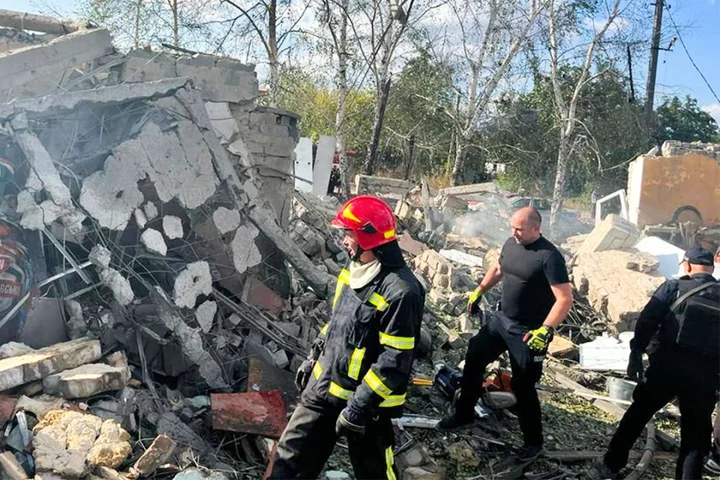
Ukraine-Russia war – live: Deadly Russian attack on memorial service was no blind strike, says Zelensky
Ukraine’s president Volodymyr Zelensky has said a Russian missile attack that killed 51 people at a memorial service was “no blind strike” and that Russian troops could not have been unaware of where they were striking. A Russian missile slammed into a cafe and shop in a village in northeastern Ukraine on Thursday, killing 51 people in Hroza village in the eastern Kharkiv region. The attack – thought to have been carried out using an Iskander ballistic missile – appears to have caused one of the biggest civilian death tolls in any single Russian strike. “One-fifth of this village has died in a single terrorist attack,” said regional Governor Oleh Synehubov. Mr Zelensky, who was attending a summit with European leaders, said: “Russian troops could not have been unaware of where they were hitting. This was no blind strike.” Separately, Russia’s Black Sea Fleet was forced into a major retreat from a Crimea port, according to the US-based Institute for the Study of War. At least 10 of Vladimir Putin’s warships retreated 237 miles to “bases further in the Russian rear” following intensified Ukrainian attacks. Read More Former Russian state TV journalist gets 8 1/2-year sentence in absentia for Ukraine war criticism Russia facing ‘functional defeat’ in the Black Sea – but Kyiv allies warn they are running out of ammunition Russia may attack civilian ships with sea mines and blame Ukraine, UK warns
2023-10-06 05:17
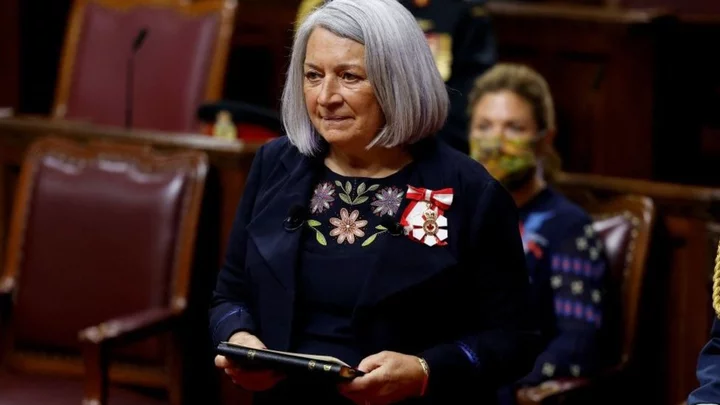
Canada Nazi row: Governor General apologises for honour given to man who fought in Waffen SS unit
The governor general's office says it regrets awarding Peter Savaryn the Order of Canada in 1987.
2023-10-06 04:59
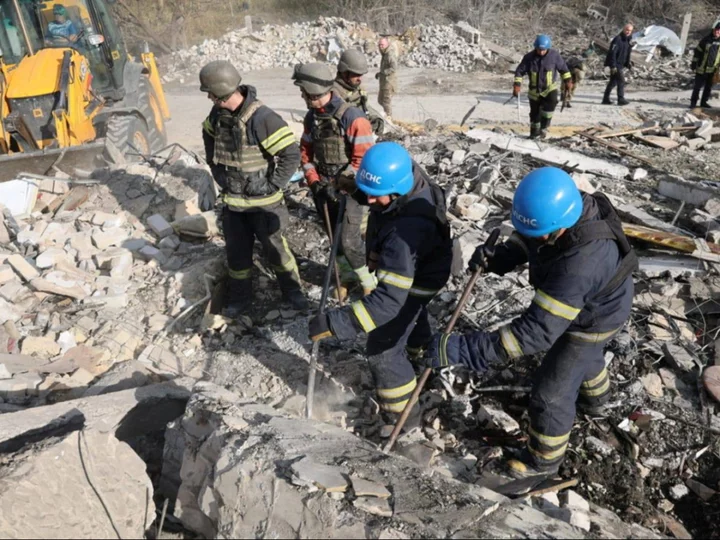
Russian missile strike kills more than 50 Ukrainians gathered for wake – in deadliest such attack in months
More than 50 people have been killed – including a six-year-old boy – after a Russian missile hit a shop and cafe in northeastern Ukraine where mourners had gathered for a wake. It is one of the deadliest such attacks since Vladimir Putin launched his invasion 19 months ago. Ukrainian President Volodymyr Zelensky, who was in the southern Spanish city of Granada for a conference with European leaders at the time of the strike, described the attack as a “brutal Russian crime” and accused Moscow of "genocidal aggression". During an emotional address to the European Political Community (EPC) in Spain, he cited the devastating impact Russian strikes were having on Ukrainian children in Kharkiv Oblast, forcing them to take school lessons in makeshift classrooms underground. A short time later officials in Kyiv said a Russian Iskander missile struck the 330-person village of Hroza in the Kharkiv region, killing at least 51, including a six-year-old boy. One image of the aftermath of the strike showed a number of bodies strewn across the floor, covered in the dust kicked up by the explosion. A handful of civilians could be seen crying behind them as two ambulance workers stood nearby. The interior minister, Ihor Klymenko, said that residents of Hroza had been holding a memorial service in the cafe that was reduced to rubble by the attack. "From every family, from every household, there were people present at this commemoration. This is a terrible tragedy," Mr Klymenko told Ukrainian television. Reacting to the strike, Kira Rudik, a leading Ukrainian opposition MP, told The Independent: “You may think that we would get used to the news of our people getting killed, but everytime it is a shock.” She reiterated the calls made by Mr Zelensky throughout the summit in Spain for more air defences and weapons from Western allies, arguing that it was essential for Ukraine “particularly to protect those places so close to the front”, such as Hroza. The village sits only around 30 miles from the nearest Russian soldiers. In recent months, thousands have fled the broader Kupyansk district, in which Groza is located, as thousands of Russian troops stage an assault of their own while Kyiv continues to push ahead with its counteroffensive further south. Mr Zelensky has visited the areas around the frontlines Kharkiv in recent days, recording a message of support for the troops battling to keep Russian forces from advancing. "The terrorists deliberately carried out the attack during lunchtime, to ensure a maximum number of casualties," Ukraine's defence minister, Rustem Umerov, said. "There were no military targets there. This is a heinous crime intended to scare Ukrainians." Mr Zelensky arrived in Spain for the European Political Community (EPC) forum on Thursday morning, meeting first with the Spanish President Pedro Sanchez before holding talks with various other leaders, including UK Prime Minister Rishi Sunak, France's President Emmanuel Macron and Italian prime minister Georgia Meloni. Though multiple issues, such as energy prices, were on the agenda for the EPC forum, the issue of supporting Ukraine was the “core” topic of discussion, according to European Commission President Ursula von der Leyen. Mr Sunak reiterated Britain's long-term support for Ukraine and said that he would be encouraging European leaders to work together to supply further defensive weapons. Both Mr Zelensky and his top aide Andriy Yermak said prior to arriving in Spain that securing new air defence systems was their top priority ahead of the winter, when Russia is expected to ramp up its missile campaign on major cities across the country. Mr Zelensky told the leaders in Granada that by providing additional military equipment to Ukraine, European countries could help ensure that a "drone, tank, or any other Russian weapon will not strike anyone else in Europe". In the wake of the attack in Kharkiv, Mr Zelensky added in a social media post: "Now we are talking with European leaders, in particular, about strengthening our air defence, about strengthening our soldiers, about giving our country protection from terror". A Spanish government source later confirmed to Reuters that Mr Sanchez had heeded that call, reporting that Spain would send both an air defence and anti-drone system to Kyiv. Ahead of the summit, German media reported that German Chancellor Olaf Scholf was reluctant to donate to Ukraine long-range Taurus missiles, despite widespread pressure from his allies to do so, over fears it would escalate tensions with Russia. The chancellor is reportedly concerned that Ukraine will use the missiles, which have a range further than the British Storm Shadows, Kyiv’s longest-range weapon to date, to hit the Kerch Strait Bridge connecting Russia to the Moscow-occupied Crimean peninsula. Mr Zelensky met with Mr Scholz on Thursday, with the two leaders discussing “working on providing Ukraine with an additional ‘Patriot’ [air defence] system for the winter months”. The meeting in Granada was also a space to shore up support for Kyiv after a weekend of political turmoil in the US. A dispute among the Republican majority in the lower chamber of the US Congress has complicated spending negotiations and prompted Democrat President Joe Biden to go from confident that a deal will be made on further Ukraine aid from Washington to openly expressing concern. Mr Zelensky admitted that there was a “political storm” over Washington but said he was “confident” that it would be resolved. “They are strong people with strong institutions, and a strong democracy,” he said. “I am confident in America.” Elsewhere, at an address in the Russian resort city of Sochi, Mr Putin accused the West of losing touch with reality over the Ukraine war. In a speech that aired many of his oft-repeated grievances against Ukraine's allies over their support for Kyiv, he also held out the possibility that Russia could resume nuclear testing for the first time in over three decades and might withdraw its ratification of a landmark nuclear test ban treaty. Read More IMF chief says the global economy has show resilience in the face of COVID, war and high rates Russia has tested a nuclear-powered missile and could revoke a global atomic test ban, Putin says Live: Karine Jean-Pierre holds White House briefing as Biden vows to stand by Ukraine
2023-10-06 01:29
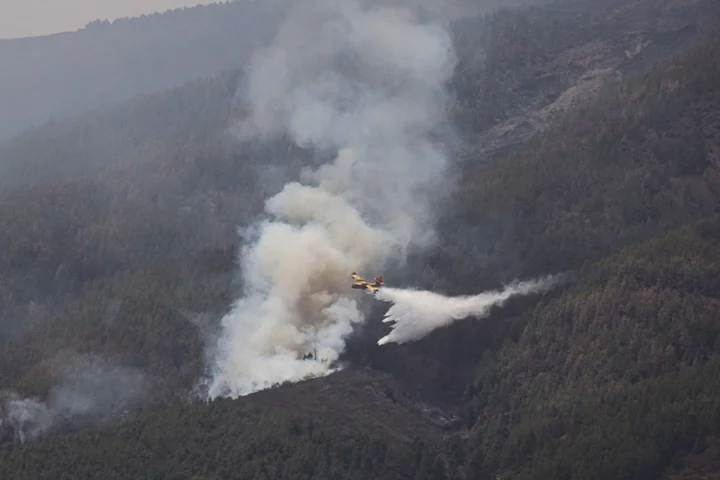
Thousands evacuated as wildfires hit Spanish tourist island
Authorities on the Spanish tourist island of Tenerife evacuated some 3,000 people from their homes overnight as a wildfire sparked by high temperatures and strong winds raged in a forested area already ravaged by fire in August. Emergency services said on Thursday on X, formerly known as Twitter, they had requested assistance from the army’s Military Emergency Unit, citing the blaze, which ignited on Wednesday, as a high level emergency. Soldiers and firefighters battled to control the fire which broke in the northeast of the island, away from the main tourist areas in the southwest. The same area suffered one of the island’s worst wildfire in decades which burned for days, destroying some 15,000 hectares (37,000 acres) of woodland within the national park surrounding the Mount Teide volcano, Spain’s highest peak. Thousands were also evacuated then, with most returning to their homes. The Canary Islands regional leader, Fernando Clavijo, told a business event in Madrid on Thursday the August fire had been brought under control but never completely extinguished, with embers still burning in the forest. He said firefighting efforts overnight had “gone well”. “There is less fuel (for the fire), so it shouldn’t get out of hand,” Clavijo said, referring to the already scorched terrain. The island, in the Atlantic off Africa’s northwestern coast, is on alert for high temperatures that are expected to reach 39 degrees Celsius (102.2 degrees Fahrenheit) throughout Thursday. Read More Spanish police reopen investigation into death of British mother in Tenerife 2023 is on track to be the hottest year ever recorded September sizzled to records and was so much warmer than average scientists call it 'mind-blowing'
2023-10-05 18:20

80-year-old Russian woman found to have lived her whole life with needle in brain
Doctors found an 80-year-old woman in Russia has lived her entire life with an inch-long needle in her brain. A local radiologist discovered a three-centimetre needle inside the octogenarian’s brain during an X-ray scan, said the Ministry of Health in Sakhalin in a Telegram post on Wednesday. The tiny needle was located in the parietal lobe of the unnamed woman’s brain, according to the ministry. While it did not disclose the exact date of discovery, it said the needle was found this year. The needle was lodged inside her brain since she was born. Doctors believe she had survived a failed infanticide attempt by her parents. In the Soviet era during the famine of the 1930s, desperate parents struggling with poverty would insert a needle into the soft spot of a baby’s head – the fontanelle – where the skull hadn’t entirely developed. It would then close, obscuring the needle, but the newborn would eventually die. “Such incidents were not uncommon during the years of starvation: a thin needle would be inserted into a newborn’s fontanel to damage the brain,” the local health department of the remote Russian region wrote on its Telegram channel. “The fontanelle quickly closed up, covering up evidence of the crime, and the baby died.” Such an attempt, believed to have been carried out on the woman who was likely born around 1943, did not lead to the intended effect. The woman had, however, occasionally complained of headaches. While doctors have decided against surgery to pull the needle, fearing it could harm the patient, “her condition is being monitored by primary care physicians”, said the ministry’s statement, adding that she was not at risk. Sakhalin is an island of 50,000 people located 6.5km off the southeastern coast in Russia and 40km of north Japan’s Hokkaido. Its control was split between the former Soviet Union and the then Japanese Empire in 1905, following a war between the two sides. The Soviet Union had seized the Japanese portion of the island in the final days of the Second World War in 1945. Read More ‘Alive and wriggling’ parasitic worm removed from brain of Australian woman Dog thought to have a brain tumour turns out to have a 7cm needle stuck in neck Pope links plight of Ukrainians today to Stalin's 'genocide' The Body in the Woods | An Independent TV Original Documentary The harrowing discovery at centre of The Independent’s new documentary
2023-10-05 16:17
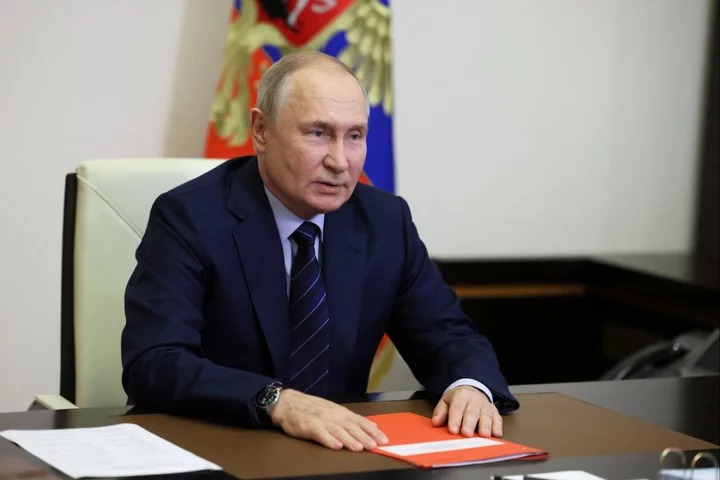
Ukraine-Russia war - live: Putin ‘may use sea mines to attack civilian ships and blame Kyiv’
Russia may use sea mines to target non-military ships and blame Ukraine for any attacks, the British government has said. Declassified intelligence warned last month that the Russian military had attempted a missile strike against a cargo ship in the Black Sea. The UK believes Russia could continue targeting civilian shipping, including by laying explosive devices in the approach to Ukrainian ports. However, Vladimir Putin’s army wants to openly avoid sinking ships in order to blame Ukraine for attacks, the government said. Foreign secretary James Cleverly said: “Russia’s pernicious targeting of civilian shipping in the Black Sea demonstrates Putin’s total disregard for civilian lives and the needs of the world’s most vulnerable. “The world is watching – and we see right through Russia’s cynical attempts to lay blame on Ukraine for their attacks. We and our allies stand united against Putin and his attempts to harm Ukraine, and thus harm the rest of the world.” Read More Former Russian state TV journalist gets 8 1/2-year sentence in absentia for Ukraine war criticism Russia facing ‘functional defeat’ in the Black Sea – but Kyiv allies warn they are running out of ammunition Russia may attack civilian ships with sea mines and blame Ukraine, UK warns
2023-10-05 13:28
You Might Like...
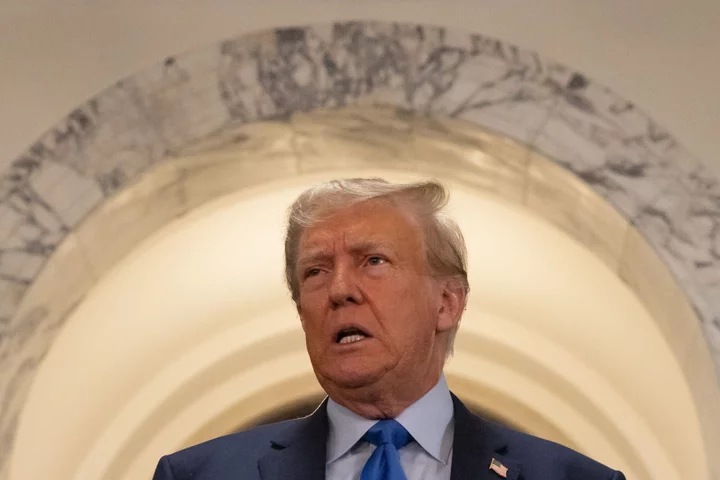
Trump Loses Bid to Strike Jan. 6 Violence From DC Indictment
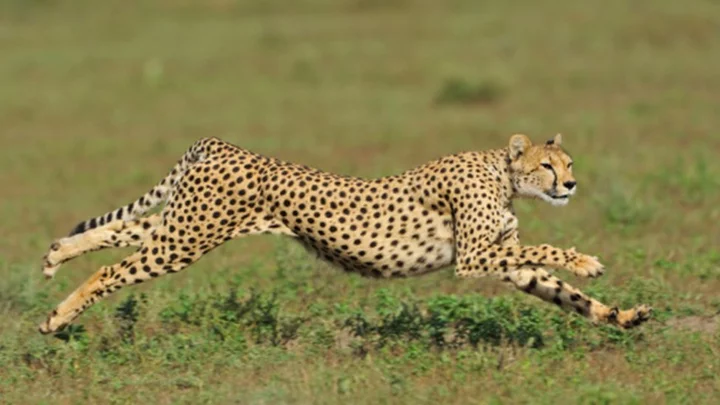
Kuno: Female cheetah dies from mating injuries in India
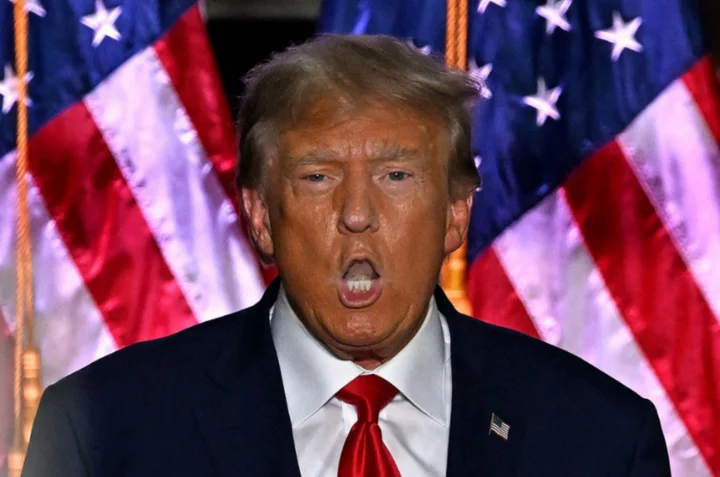
Trump indictment – live: Trump claims boxes of classified papers actually held clothes in post-arrest speech
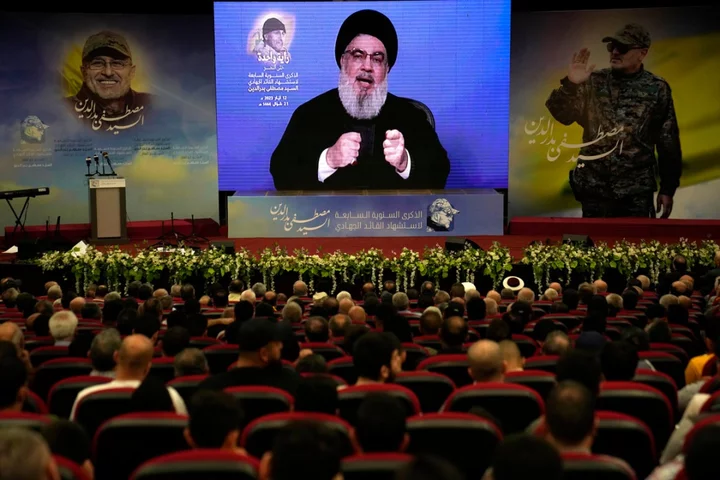
Hezbollah leader denies reports linking the Iran-backed group to Syria's drug dealer
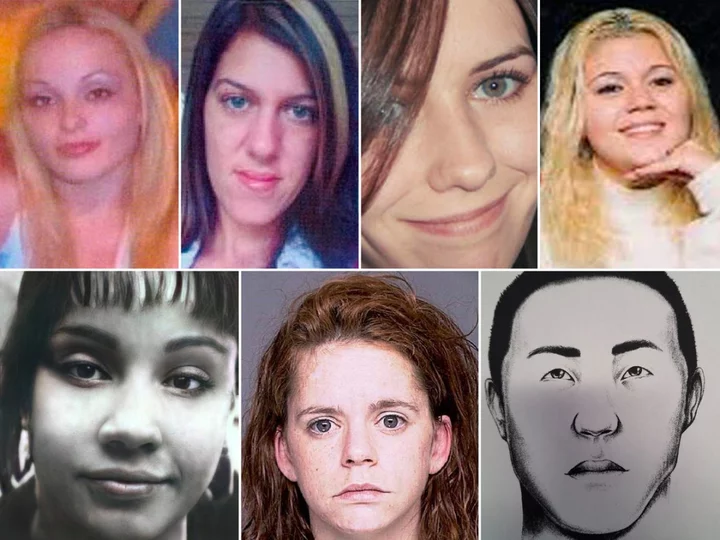
How the Gilgo Beach serial killer turned the Long Island shore into a graveyard
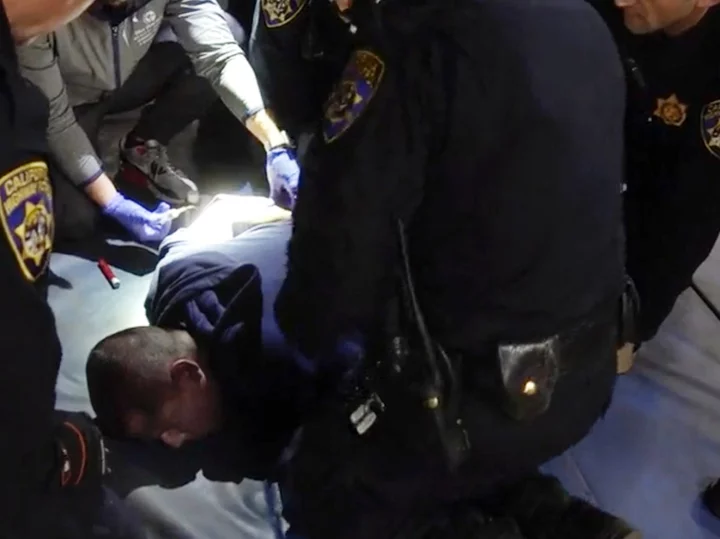
California reaches $24 million settlement with family of man who died in police custody
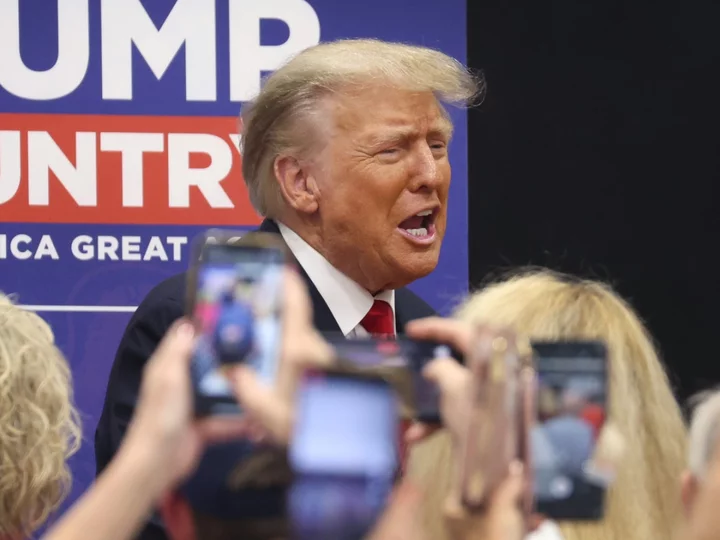
Trump described Pentagon ‘plan of attack’ and shared classified military map with PAC member, indictment shows
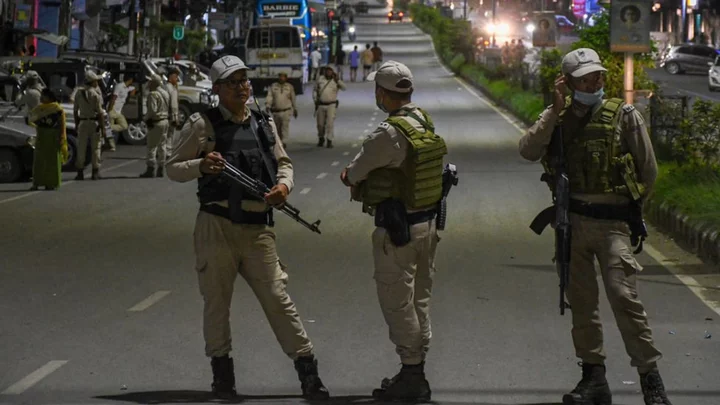
Manipur: India outrage after two women paraded naked in violence-hit state
